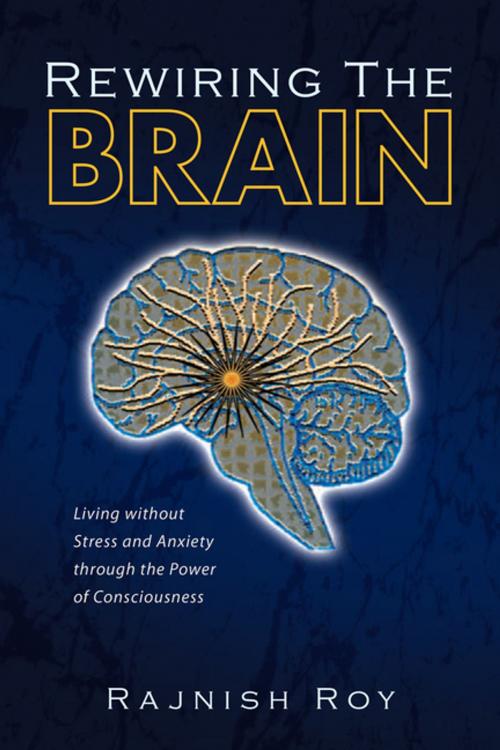Rewiring the Brain
Living Without Stress and Anxiety Through the Power of Consciousness
Nonfiction, Religion & Spirituality, New Age| Author: | Rajnish Roy | ISBN: | 9781462812691 |
| Publisher: | Xlibris US | Publication: | November 28, 2007 |
| Imprint: | Xlibris US | Language: | English |
| Author: | Rajnish Roy |
| ISBN: | 9781462812691 |
| Publisher: | Xlibris US |
| Publication: | November 28, 2007 |
| Imprint: | Xlibris US |
| Language: | English |
Rewiring the Brain is not just another book on stress. It explores a daring and innovative path to accessing the power of consciousness as a more effective and lasting solution to tackle stress and emotional afflictions. The present remedies, such as drills of positive thinking and self-hypnosis through beliefs, accrue only temporary solace and euphoria that wear off sooner than expected. Also our reasoning power is not able to rein in the unyielding force of negative emotions that fuel stress and depression. Hence, this book pursues a new approach.
It outlines also certain ways that slow down aging process and enhance memory, attention span, and emotional equilibrium. The book is a fascinating journey to the inner world of self—its constructs of emotions, thoughts, and memories—to discover why one behaves the way one does. We go through myriads of joys and sorrows in the long course of life, but hardly have the patience to pause and ponder over the reasons that make them.
Does it matter? Yes, much more than perhaps one realizes.
Stress should not be seen as an isolated issue. It betrays the quality of individual self in its ceaseless action of living. We have one and only life—the most precious thing we happen to possess, and it is but natural that we struggle hard to do our utmost to make it a wonderful experience. Stress, in its overt or covert forms, works as a persistent factor that undermines the spontaneity, joy, and beauty of life.
In this competitive and complex world, one faces countless factors of stress that are unavoidable and immutable, including illness, accident, or death. There are some other factors that can be altered through efforts, which play a more decisive role in life. These are individual attitude, mental tendencies, and ways one interacts with external world. There is much truth in the saying “Life is 10 percent what happens to you and 90 percent how you react to it.”
An objective understanding of these individual factors means that half the battle of tackling stress is won. Hence, the book seeks to help the reader face and understand the workings of inner self and its intricacies without resorting to psychological escape or suppression.
Yet an objective understanding is only the first step. It does not resolutely change our mental habits and conditionings that are hardwired in the brain. This suggests the need to go beyond the remedies prevalent now and look for fundamentally new solutions. In such effort, this book explores the possibility of using the power of consciousness to rewire the brain and tackle stress.
The book has a refreshingly open-minded approach, devoid of religious ideologies or mystical beliefs, and does not involve psychological escapes. The practical methods and benefits are outlined in a scientific spirit and correlated with research by neuroscientists, psychologists, and medical institutes. The book does not offer shortcuts or peripheral solutions, because none exists. Neither does it offer self-hypnosis and gratifying beliefs that are concealed in prescriptive actions and mental drills.
It is an irrefutable fact that consciousness embodies our unique sense of self and its complex architecture. Moreover, all our mental processes like feelings, memories, and thoughts are not only rooted in consciousness but sustained by it. It is logical that harnessing the power of consciousness, the primordial source of all mental phenomena, will unfold unique possibilities to tackle negative emotions and anxieties that rob us of the charm and joy of the miracle of life.
A theoretical debate is being waged relentlessly among experts on the mysteries and elusive nature of consciousness. However, not much research is done on the practical use of the power of consciousness for tackling the human predicament of stress and anxiety. In that direction, Rewiring the Brain is a brilliant endeavor to synthesize the latest research on
Rewiring the Brain is not just another book on stress. It explores a daring and innovative path to accessing the power of consciousness as a more effective and lasting solution to tackle stress and emotional afflictions. The present remedies, such as drills of positive thinking and self-hypnosis through beliefs, accrue only temporary solace and euphoria that wear off sooner than expected. Also our reasoning power is not able to rein in the unyielding force of negative emotions that fuel stress and depression. Hence, this book pursues a new approach.
It outlines also certain ways that slow down aging process and enhance memory, attention span, and emotional equilibrium. The book is a fascinating journey to the inner world of self—its constructs of emotions, thoughts, and memories—to discover why one behaves the way one does. We go through myriads of joys and sorrows in the long course of life, but hardly have the patience to pause and ponder over the reasons that make them.
Does it matter? Yes, much more than perhaps one realizes.
Stress should not be seen as an isolated issue. It betrays the quality of individual self in its ceaseless action of living. We have one and only life—the most precious thing we happen to possess, and it is but natural that we struggle hard to do our utmost to make it a wonderful experience. Stress, in its overt or covert forms, works as a persistent factor that undermines the spontaneity, joy, and beauty of life.
In this competitive and complex world, one faces countless factors of stress that are unavoidable and immutable, including illness, accident, or death. There are some other factors that can be altered through efforts, which play a more decisive role in life. These are individual attitude, mental tendencies, and ways one interacts with external world. There is much truth in the saying “Life is 10 percent what happens to you and 90 percent how you react to it.”
An objective understanding of these individual factors means that half the battle of tackling stress is won. Hence, the book seeks to help the reader face and understand the workings of inner self and its intricacies without resorting to psychological escape or suppression.
Yet an objective understanding is only the first step. It does not resolutely change our mental habits and conditionings that are hardwired in the brain. This suggests the need to go beyond the remedies prevalent now and look for fundamentally new solutions. In such effort, this book explores the possibility of using the power of consciousness to rewire the brain and tackle stress.
The book has a refreshingly open-minded approach, devoid of religious ideologies or mystical beliefs, and does not involve psychological escapes. The practical methods and benefits are outlined in a scientific spirit and correlated with research by neuroscientists, psychologists, and medical institutes. The book does not offer shortcuts or peripheral solutions, because none exists. Neither does it offer self-hypnosis and gratifying beliefs that are concealed in prescriptive actions and mental drills.
It is an irrefutable fact that consciousness embodies our unique sense of self and its complex architecture. Moreover, all our mental processes like feelings, memories, and thoughts are not only rooted in consciousness but sustained by it. It is logical that harnessing the power of consciousness, the primordial source of all mental phenomena, will unfold unique possibilities to tackle negative emotions and anxieties that rob us of the charm and joy of the miracle of life.
A theoretical debate is being waged relentlessly among experts on the mysteries and elusive nature of consciousness. However, not much research is done on the practical use of the power of consciousness for tackling the human predicament of stress and anxiety. In that direction, Rewiring the Brain is a brilliant endeavor to synthesize the latest research on















